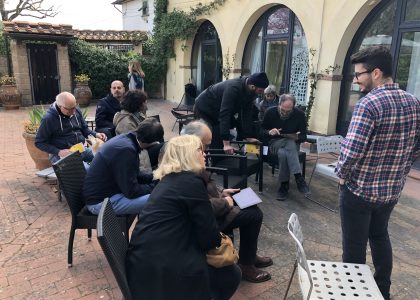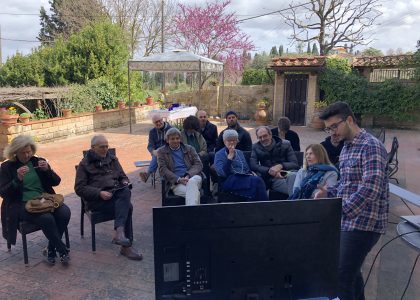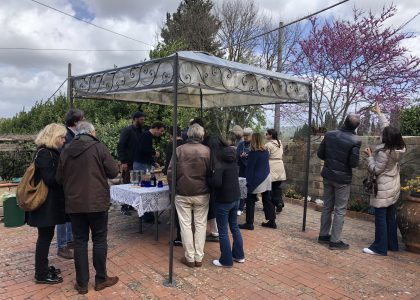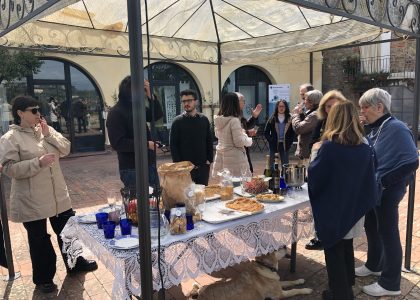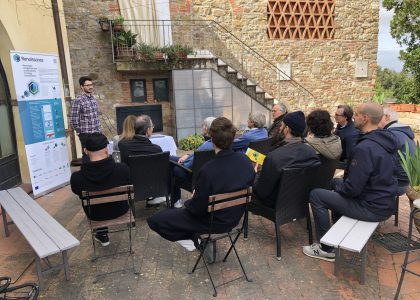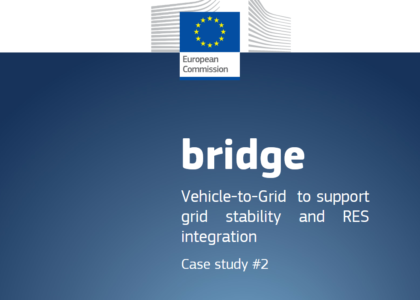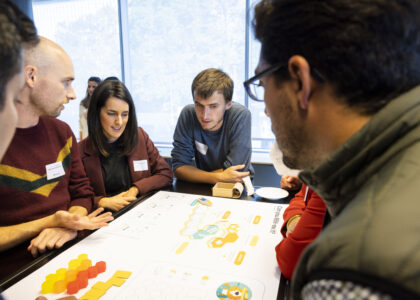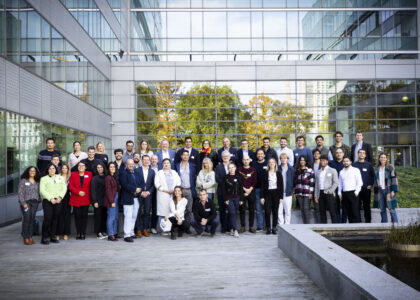by Shary Heuninckx, researcher and head of Enerjettic project @Vrije Universiteit Brussels
Finally our report from the Firenze citizen engagement workshop is out! On Saturday April 9th two VUB members of the RENAISSANCE project team travelled to Firenze to engage the residents of a neighbourhood in the rural town of Impruneta in an on-site workshop.
Context
Italian start-up Enco – Energia Collettiva aims to quickstart energy communities (ECs) by taking away the barriers citizens often experience during a set-up. They deal with the potential red tape and take over the installation of smart meters, PV panels and storage systems, the practical set-up and registration of the EC as well as the management. Profits are used to pay back installation costs and are distributed fairly among the participants.
They came in contact with the RENAISSANCE team to see how their own mission and working method could be combined with the methodology that is developed within the H2020 project. As a test case one of their project sites was chosen: in Impruneta, a rural Tuscan town in the south of the Metropolitan City of Florence, an EC initiative would be set-up between neighbouring citizens. Three of them are prosumers with installed PV, and five are consumers.
Using the Renergise and MAMCA tools, calculations and an engagement process were set up to determine together with the citizens what an EC for Impruneta could look like, and what community options could gather the most support for implementation. Results from this case can teach important lessons on what the main points of attention are for citizens of rural southern towns on the added value engagement efforts can bring here.
Workshop approach
The workshop was organised on site, on a communal premise where the local citizens regularly meet. Next to the residents, representatives of the municipality as well as of the DSO were invited to join. Only the latter did not wat to join the workshop. The invitation was distributed by Enco, who visited all potential participants personally to explain them the goal of the initiative and provided them with a pre-set survey that asked about their personal motivations to join an EC initiative. This survey was filled out by 4 consumers, 3 prosumers, the municipality, and the DSO.
The 2-hour workshop itself had two 2 focus points: one was to give more detailed explanation on the advantages and disadvantages of an EC in general and for Impruneta specifically and to provide an answer to prevailing questions, and another one was to let the participants discuss various aspects of an EC in an interactive way using the MAMCA software. This way, knowledge and awareness could be raised, while at the same time providing an opportunity to the relevant stakeholders to actively participate in the considerations of various EC alternatives, by stimulation their input and mutual discussions.
A total of 14 local participants (among which two municipality representatives) attended the workshop, and discussions that started during the session were vividly continued during the lunch afterwards.
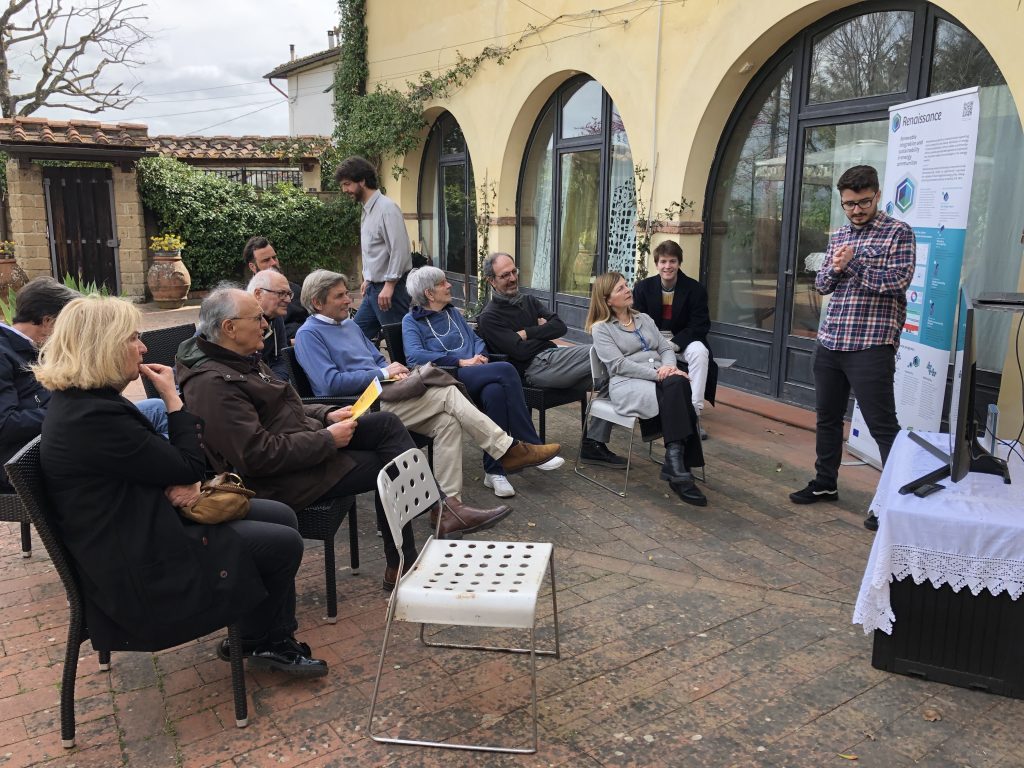
Results
During the interactive MAMCA part of the workshop, 3 groups were formed that had to first give an importance ‘weight’ to their main motivations for joining an EC initiative (derived from the pre-completed survey), and then evaluate how various EC ‘scenarios’ complied with each of these motivations. The group of consumers indicated that financial objectives like lower their energy bill were deemed most important, followed by environmental objectives such as lower emissions, the raising of their own sustainability awareness and a low visual and noise disturbance. The group of prosumers gave equal weights to environmental (emissions reduction and a higher rate of renewable energy) and financial (lower energy bill and return on investment) motivations, as well as the fact that they would like to have a bigger autonomy in energy matters. The municipality wants a bigger direct say for their inhabitants in the decision making on their own energy supply and more autonomy. It also vows for systems that raise general sustainability awareness among citizens. For the evaluation of the EC scenarios, pre-calculated results for various financial, technical and environmental objectives were provided.
The scenarios revolved around the new legislation for renewable energy communities (RECs) in Italy, which gives subsidies for PV installations in a REC as well as economic incentives for collectively self-consumed energy. The evaluation results showed that a larger EC that includes a bigger part of the neighbourhood complies more with the objectives of all stakeholders than the one currently under consideration. It was also clear that a scenario in which no energy is exchanged, and people only consume their self-produced energy, scores worse on almost all selected objectives than an EC scenario. The business-as-usual scenario with less PV represented the one with the lowest preference among participants. A future in which electricity prices will raise even more will bring more financial benefit to the EC scenarios. A simulation where consumption profiles are shifted towards PV peak production times also has big financial benefits, underlining once more how the awareness of the consumers can be beneficial for energy efficiency.
To get an insight in the potential effects of the workshop a pre- and post-survey on expectations and evaluation was conducted. The results indicated that participants felt that they received an answer to the main questions they had on ECs when entering the workshop, they had the chance to voice their concerns and that they gained more insight into the motivations of others and feel more willing to compromise to come to a common agreement. Their knowledge on EC opportunities in general and for Impruneta specifically also increased. Most of them did indicate that participation in the workshop did not change their own motivations, and it was also mentioned that a deeper investigation of the potential contract structures would have been a nice addition.
Conclusions
The workshop initiated a lot of discussion amongst participants and gave them the opportunity to voice their concerns and ask questions. Most of the participants were not familiar with the concept of energy communities and the benefits that a REC can bring to their community. There were also only few participants that already knew about the financial incentives available through the transposition of the new European legislation on ECs into the Italian context, or about how their consumer behaviour can have a big impact on their energy bill. In terms of engagement, the general feeling is that the awareness of the opportunities an EC can bring to the neighbourhood was raised, as was knowledge on potential forms this community can take on (and their pros and cons). The fact that not only potential members but also a representative of the municipality was present, made that the discussion reflected different interests and both types of stakeholders gained better insight in the mutual concerns. Willingness to take on the common initiative was sparked and the ‘community feeling’ that is indispensable to form an EC was further strengthened.
Follow us:
